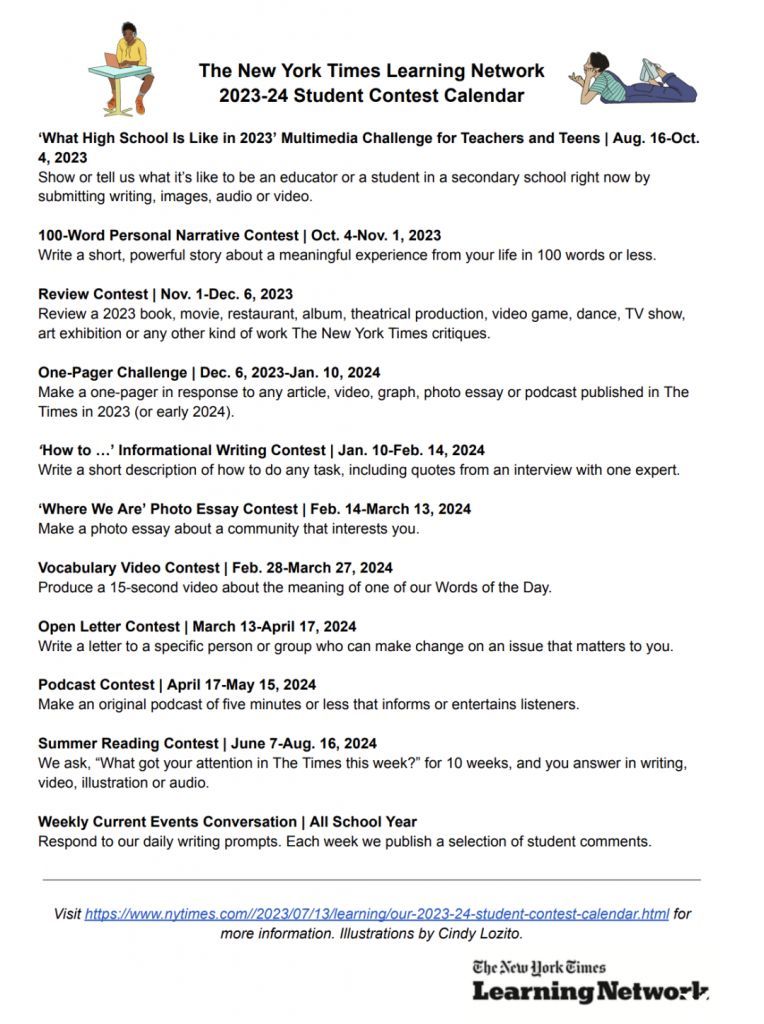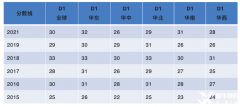发布时间:2024-01-19 10:11:53 编辑:Lisa来源:未知
纽约时报写作竞赛是什么?有没有文科生可以参加的国际竞赛呢?纽约时报STEM写作竞赛是什么?如何写出让人眼前一亮的内容?
差一项《纽约时报STEM写作竞赛》!能让招生官眼前一亮的理工科科普写作竞赛,确定不了解一下?
01、纽约时报写作竞赛介绍
纽约时报旗下有很多的写作竞赛,今天着重介绍一项主要培养学生科学探究和发现精神的科学写作竞赛——纽约时报STEM写作竞赛。(其余偏文科、娱乐的写作竞赛将在文末按时间轴整理给大家。)
美本申请系统(Common Application)中有一个honor选项,要求填上9年级以上获得的最重要的5个奖项,以及10个课外活动。
STEM写作竞赛完全可以成为那1/5。且不说这项竞赛的评委均为《纽约时报》资深编辑,综合获奖率不到2%,专业的评审和超低的获奖率都凸显着赛事的高含金量。该赛事还不受专业限制,是写作竞赛领域少见的“文理综合体”。
参加纽约时报竞赛有哪些好处?
1、锻炼读写能力
2、提前适应文书
3、向全球学生免费开放
4、填补奖项履历,吸引全球顶尖大学招生官的注意
当然,纽约时报写作竞赛中,除了STEM,还有很多其它高含金量、有趣的项目:
例如:
社会评论大赛、播客、叙事写作...

02、纽约时报写作竞赛
适合哪些参赛人群?
从纽约时报写作竞赛的竞赛规则上来看:1️⃣对参赛地区没有限制且免费报名,也就是说全球学生都可以免费参赛;2️⃣向11-19岁的学生开放,但是更建议9-11年级的高中生参加;3️⃣此外,如果学生在生活中是一个敏锐的人,善于发现问题,那么在很多写作项目中都会有很大的优势。
03、STEM写作竞赛范文展示
STEM写作竞赛的要求如下:
命题要求:选择关于科学、技术、工程、数学或健康领域的议题
字数要求:不超过500字参赛须知:每名学生只能递交一篇官网地址:
https://www.nytimes.com/2023/08/02/learning/teach-writing-with-the-new-york-times-our-2023-24-curriculum.html
“Nature’s Solution to Plastic Pollution: The Amazing Power of the Wax Worm”
by Justin Wang, 16, from Alhambra High School in Alhambra, Calif.
Scientists hold their breath as they slowly cut open the belly of the world’s largest animal, the whale. What tumbles out is horrifying: thousands of pieces of plastic weighing a staggering 220 pounds. In the winter of 2019, a young sperm whale was found dead on Luskentyre Beach in Scotland. Scientists concluded that a combination of nylon fishing nets and plastic bags clogged up the digestive system and starved the poor whale to death. Heartbreaking scenes like these, not uncommon in recent years, are a direct result of our human carelessness.Efforts have been made to reduce plastic waste through reusing and recycling, but they are not nearly enough. Luckily, a recent discovery has brought some relief to both scientists and environmentalists.Meet Dr. Federica Bertocchini, a Spanish biologist doubling as an amateur beekeeper. While cleaning out her hives, she noticed hive-damaging worms eating the beeswax and started to remove them. After tossing the worms into a plastic bag, she spotted small holes in it. Dr. Bertocchini examined the holes, and realized that the worms were feasting away at the plastic! Her biologist instincts kicked in, spurring her to bring the worms into a lab.The Galleria mellonella larvae, also known as the “wax worm,” can seemingly “eat” polyethylene, one of the longest-lasting plastics that is very simple to make but hard to break down. Subsequent tests revealed the capability of these worms to chemically dissolve plastic at an unprecedented rate. What gives this worm such an ability? It turns out that beeswax and plastic are both composed of long chains of carbon, which allows phenol oxidase enzymes in worm saliva to oxidize and destroy these polymers. But the worms don’t care about this technical jargon — to them, it’s just another tasty treat.Instead of raising millions of baby worms and letting them wander leisurely through plastic paradise, a more practical solution would be to harvest and replicate these enzymes for plastic degradation. As the team’s discovery gathers attention, Dr. Bertocchini suggests that water-based enzyme solutions could be implemented by waste processing plants or at-home plastic waste kits, establishing a wider distribution of this game-changing technology. With the participation of families all around the world, a trickle can become a torrent. What’s left would only be natural components, such as ketones or alcohol, deemed safe for release or reuse in other processes.Although using wax worm saliva to dissolve plastic might not be a widespread solution for decades to come, it shines a light on sustainable ways to reduce waste. Bio-recycling, which uses nature to make resources from waste, has gained recognition as more people realize the efficiency of these methods. These little worms seem to be acting as messengers, reminding us to live in harmony with nature.
Work Cited参考文献·Bromwich, Jonah Engel. “A Very Hungry Caterpillar Eats Plastic Bags, Researchers Say.” The New York Times, 27 April 2017.·Diaz, Johnny. “Dead Whale, 220 Pounds of Debris Inside, Is a ‘Grim Reminder’ of Ocean Trash.” The New York Times, 2 Dec. 2019.·McGrath, Matt. “‘Humble’ Worm Saliva Can Break Down Tough Plastic.” BBC News, 5 Oct. 2022.·Sanluis-Verdes, A., et al. “Wax Worm Saliva and the Enzymes Therein Are the Key to Polyethylene Degradation by Galleria mellonella.” Nature Communications, 4 Oct. 2022.
*范文参考:来源纽约时报官网
如果需要更多范文
或者需要提升写作能力点击在线咨询了解
04、纽约时报写作竞赛时间线
文、理科生后续可以参加的纽约时报写作项目如下(已经结束的项目不做整理):
1、信息写作竞赛
竞赛时间:
2024年1月10日 - 2024年2月14日
竞赛形式:
不超过400个单词的文章
主题:以《纽约时报》杂志长期开设的Tip Column作为参考,写一篇简短的文章,向我们介绍该如何完成某一种任务。
TIP专栏链接:
https://www.nytimes.com/column/magazine-tip
官网:
https://www.nytimes.com/2020/01/23/learning/informational-writing-unit.html
2、社区摄影比赛
竞赛时间:
2024年2月14日 - 2024年3月13日
竞赛形式:
5-7张带有标题和简短介绍的照片
参赛对象:13-19岁中学生
主题:受《纽约时报》 Where We Are系列的启发,纽约时报邀请学生拍摄他们感兴趣的社区照片,可以是您自己拍摄或与他人合作拍摄。
Where We Are专栏链接:
https://www.nytimes.com/series/where-we-are
3、词汇视频竞赛
竞赛时间:
2024年2月28日 - 2024年3月27日
竞赛形式:
15秒原创视频
主题:录制一段15秒的视频,介绍“每日单词”专栏(Words of the Day)中任何一个单词的含义。只能使用2023年6月1日之后在专栏中发布的单词。
Word of the Day专栏链接:
https://www.nytimes.com/column/learning-word-of-the-day
获奖视频参考:
https://www.nytimes.com/2023/02/01/learning/student-vocabulary-challenge-invent-a-word.html
4、社论写作竞赛
竞赛时间:
2024年3月13日 - 2024年4月17日
竞赛形式:
不超过450个单词(不含标题)的文章
主题:用公开信的形式阐述您的观点。
获奖率:比赛结束后大约两个月公布获奖信息,2022年综合获奖率仅1.2%。
5、播客竞赛
竞赛时间:
2024年4月17日 - 2024年5月15日
竞赛形式:
制作一个五分钟或更短的原创播客,告知或娱乐听众。可以聆听往届获奖者的作品获得灵感。
主题:
讲一个故事,也许是关于童年的记忆、改变你一生的经历,或者是一段糟糕的恋情,无论是关于流行文化、体育、美食、时尚、科技、政治或性别角色等与新闻相关的问题,还是您自己的爱好、激情或关注点。
官网:
https://www.nytimes.com/2023/03/30/learning/our-6th-annual-student-podcast-contest.html#link-305ed21a
6、夏季读写竞赛
竞赛时间:
2024年6月7日 - 2024年8月16日
竞赛形式:
根据《纽约时报》当周发布的报道、社论、照片等内容,围绕“What interested you most in The Times this week?Why?”进行不超过250-300个单词(不超过1500个字母)的回答。
主题:是什么引起了你在《纽约时报》上的关注,以及为什么。
获奖率:比赛期间的每个星期二,官方将在单独的帖子中公布前一周的获胜者,综合获奖率达到了5%以上。
官网:
https://www.nytimes.com/2023/04/27/learning/our-14th-annual-summer-reading-contest.html
如有任何写作竞赛疑问/资讯在线咨询了解

AMC04-17


物理碗04-23

物理碗06-05


化学竞赛01-11